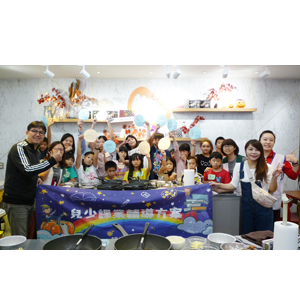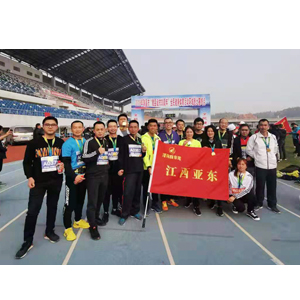02.2020 Story
Pattern and tolerance (II)
Far eastern New Century Corporation / Liu Zuliang


The powerlessness and pain to the real environment are often the most touching articles. Liu e's "I was born in today's China. I have the feelings of life experience, religion and society. The deeper I feel, the more I grieve." Qiu Fengjia's "prime minister has the power to cut the land, and the less I can return to the sky." or Shi Dakai's "I only feel the heaven and save the yuan with my bare hands" are moving people's hearts and winning a sigh for thousands of years. However, in my opinion, when it comes to the depth of grief, the drama of mourning and the cutting of injustice, no article can be compared with Li Lingda's Su Wu Shu. Let's take a look at what Li Ling said
"In the past, the emperor granted five thousand soldiers to fight in the forbidden area. The five generals lost their way and the mausoleum was alone in battle. And the food that covers thousands of Li, the commander of handsome walking, outside the heaven and the Han Dynasty, into the territory of strong Hu. With five thousand men, and with a hundred thousand men, and with weary men, they are new horses. However, he still killed the flag of the general, ran after the north, wiped out the traces and swept the dust, and beheaded his commander. Let the men of the three armies see death as their return. Mausoleum is not only a talent, but also a great responsibility, which means that at this time, the work is embarrassing. "
The above-mentioned words use haiku commonly used in Han Dynasty articles, such as "with 5000 people, to 100000 troops, to be tired soldiers, to be new horses". Not only can the article read forcefully, but also can emphasize the key points through the echo of the sentences before and after. "Five thousand to one hundred thousand troops" shows the great disparity in the number of enemies and ourselves; the "policy of tired soldiers, when the new horses" emphasizes that the people are tired, while the enemy is a sharp and well supplied division.
After describing the great disparity between the enemy and our strength, the momentum of the article turned to "still beheading the flag, chasing the north, wiping out the traces and sweeping the dust, beheading its commander.". It's 27 words to make the soldiers of the three armies look at death as if they are going home. Even though they are thousands of years apart, it's not hard to imagine the courage and heroism of this young hero.
The next words are as follows:
"Since the Xiongnu was defeated, the whole country has built up its divisions and trained its troops. They are more than 100000 strong. They are alone in the battle and surrounded by themselves. The shape of the guest and the host is not the same, but the momentum of the horse is very great. Tired soldiers fight again, one thousand; however, they are still in pain and determined to fight for the first place. There are more than a hundred dead and wounded Jiye, but they all help the sick and don't allow to fight. However, when Ling rallied his arms, all the wounded and sick started, he raised his blade and pointed at the prisoners, and Hu Ma ran away. The soldiers were poor, and the men had no iron and ruler, so they fought for the first place. "
After the defeat of the Huns in the first battle, as many as 100000 soldiers and horses were mobilized again, and the king (Shan Yu) drove them to fight. In addition to the disproportion in number and morale, the two sides are also very different in equipment (the Han army is infantry, the Huns are cavalry, the latter is fast and has strong breakthrough force. As far as the war history I have read is concerned, if the cavalry is surrounded by infantry, it is possible for cavalry to make use of the advantages of speed, move quickly, find the weakness in the encirclement, and strike a breakthrough. On the contrary, once the infantry with relatively slow movement are surrounded, they will probably only have to stick to the rescue route). Li Ling is facing a desperate situation where he can't escape, fight and win, and reinforcements are hopeless! Li Lingsi's sighs of the time and the place. Hundreds of years later, Zhang Xun sighed, Yang Ye sighed, and Shi Kefa sighed. Huang Baitao, who was trapped in nianzhuang during the battle of Xu beng, probably also sighed.
Li Ling led a "exhausted army" by himself, which highlighted the weakness of the Han Army in quantity and quality (in the open terrain, it is difficult for infantry to fight against cavalry, let alone against cavalry dozens of times their own). However, after that, the spirit of fighting for the first place was written on paper. It's impossible to take one for ten, but these wounded lonely armies take one for thousands. Of course, their physical strength can't last. The Han army with less than a hundred people was surrounded by Hun cavalry. Their whole body was covered with blood. They couldn't even hold their weapons. The reason why they couldn't stand up was just unyielding! Seeing that the bloody battle is coming to an end, Li Ling suddenly raises his arms and shouts loudly. It's the remnant soldiers who wave their weapons and rush to the enemy Although thousands of years later, I can still feel the sadness of the hero's end, and Li Ling finally fell.
When Li Ling was in Xiongnu, there was another person who was unknown at that time, but later left his name for thousands of years, who was also trapped in Si, that is suwu. The Xiongnu king once asked Li Ling to persuade Su Wu to surrender, but Su Wu refused. When Su Wu was released and returned to the Han Dynasty, Li Ling personally left for him and danced and sang at the table, with tears in his eyes. After Su Wu's return to the Han Dynasty, the two sides also had fish and wild geese to and from each other.
Su Wu was detained by Xiongnu for 19 years, and he was unyielding all the time. However, after Su Wu returned, did the Han Dynasty treat him kindly? Li Ling's answer to Su Wu Shu gives the answer:
"In the year of Ding, when he was appointed, he returned with a fine head. My mother died and gave birth to a wife. The world has never heard of it before. The man of manchen is still the king of the world? Mausoleum is a kind of foot. You should enjoy the recommendation of Maotu and be rewarded by thousands of riders. After hearing about the return of the son, he was given no more than two million yuan, no more than a state, no more than a seal of land, and no more than diligence. And the officials who hinder their functions and abilities are all Marquises of ten thousand families, and the relatives are greedy and sycophantic, and so on. "
In addition to the pain in Su Wu's heart, Li Ling also mentioned that "such a feat, in my opinion, should be sealed by cracking the earth.". As a result, I heard that after your return to the Han Dynasty, the reward was no more than 2 million yuan, and the official was just a small immigration administrator (a country of worship). Those villains and villains, who were bribed and nepotized, could squeeze themselves into the temple and worship the marquis. ".
Li Ling may think that Su Wu will beat the wall and cry, shouting at heaven! However, if Su Wu was greedy for wealth or titles, he would have surrendered. After all, when he was shepherding in Baikal Lake in Siberia, how could he know that he still had a day to return to his hometown? At that time, the most likely outcome was the death of a stranger, and for the Han Dynasty, he was nothing but a "missing person". To support his belief of 19 years is only to do what an emissary should do. As a civil servant who feeds on the salary of the state, he insists on the principle of "what to learn from reading sages' books" and the principle of "being honest now and then". With such a mind, Li Ling didn't know anything about it, so he regretted Su Wu in his letter.
A battle in the second year of the Han Dynasty tangled the lives of the three officials of the Western Han Dynasty. We saw Sima Qian's persistence in mission inheritance, Su Wu's persistence in keeping the peace, and Li Ling's bravery and misfortune. These three periods of life are wonderful, however, there is still a little difference between them.
Li Ling's talent is amazing, his encounter is lamentable, and his fate is nothing better than this. However, he lacks Sima Qian's humiliating sentiment and Su Wu's stubbornness in adhering to his ideas, which makes him more angry and highly inadequate. He forgets that the most admired people in the history books are those who don't care about the justice of the moment and don't mind the reputation of the moment! It is because of "doing what we should do" that these people can "hang the red ink one by one". Perhaps Li Ling, who has been mutilated under Jiuquan, has the most regrets and regrets about this defect!
It is often said that "the degree of utensils determines the height and the pattern determines the outcome". The degree and pattern of Li Ling, Su Wu and Sima Qian determine their position in the long history. We dare not say what can be left in history, but in the workplace, we can at least be clean, fair and honest, do not love power, and do not seek personal gain. Although it is far from the broad scale and pattern, the end will not be equal to the greedy villain at least.



















